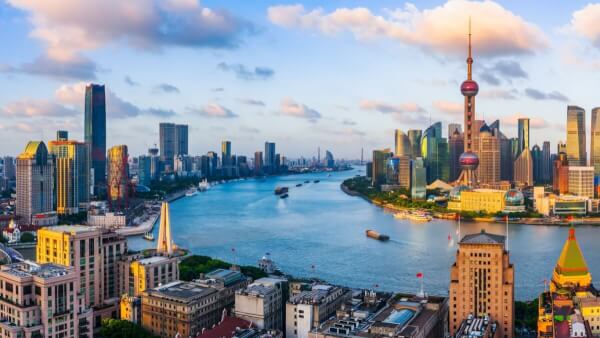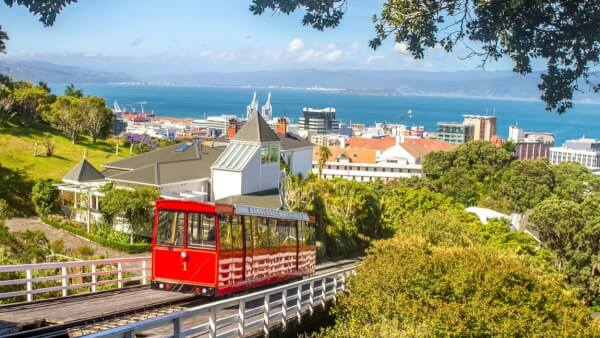Travelling to the Philippines from Australia. The Lowdown
Travelling from Australia to the Philippines? Let’s fill you in on the travel requirements, touristy and non-touristy spots and other need to knows in our guide

China has a long and colourful history, and looks set to become an ever more important player in global events as time goes on. What better time could there be to visit? Head to the Great Wall, go diving off Hainan Island, search for giant pandas, or live it up in Shanghai, Beijing or any of the other large and vibrant cities.
You’ll be able to make your money go further in China if you cut out excessive bank and currency fees. Get yourself a Wise borderless account and linked Mastercard, and you might have more to spend on yourself while you travel. We’ll look at how, later.
China is a huge country. You could spend a lifetime of holidays here and not see everything. So where do you begin?
The official tourism website of the Chinese government has some great tools to get inspiration, including trips sorted by theme - think about a holiday based around travelling the Silk Road, or visiting UNESCO World Heritage Sites. You’ll also be able to plan a visit to capture the best of cuisine or culture, or take advantage of many of the other exciting things China has to offer¹.
While you’re researching, it’s also smart to look for advice and ideas specific to your trip. If you’re planning on eating all the street food you can lay your hands on, get up to date with food hygiene precautions. If you’re headed for specific cultural sites note the opening hours and any closures due to festivals or public holidays. And don’t forget to check out the best way to get from the airport to your first hotel, to make it a little easier to hit the ground running.
Learn more including advice on safety and details of the visa processes, on the China page on the Smart Traveller website².
China has developed enormously over recent years, and this has resulted in increases in the cost of living, especially in the cities. While your dollars will go a long way in the countryside, you’ll need to be prepared to fork out if you’re there for shopping, cultural activities, or fine dining in the cities.
One sensible way to make your money go further is to get the best available exchange rate when you convert your dollars to yuan.
Use an online currency converter or app, which will show the mid-market exchange rate, and use this to compare against the rates you’re given when exchanging currency. The mid-market rate is the one banks and exchange services get when they buy currency - but it’s common to add a markup or margin to the rate passed on to customers.
This is an extra fee and can mean you pay more than you anticipate for your yuan. Avoid this markup by using the Wise borderless account and card. More on that later.
It’s convenient to use your bank card for spending and withdrawals when you travel - and this can often be a smart way to get a decent exchange rate. However, your own bank might add extra fees which you’ll need to know about. Check if you’ll be charged a flat fee, a percentage charge - or both - for spending when abroad. These fees may not seem very high - often around 2% - 3%, but they quickly mount up.
If you get caught out by DCC you’ll end up paying more than you need to when using your card overseas. DCC is where you’re given the option to pay in either your home currency or the local one when you spend in a store or make an ATM withdrawal.
Banks sell this as a service - it’s easier to pay in your home currency because you don’t need to do the conversion calculations yourself. But DCC can lead to excessive fees and a poor exchange rate. Always opt to pay in the local currency to get the best deal available.
A Wise borderless account is a great way to manage your money while overseas, and can reduce both the fees and the hassle of spending abroad.
You can hold, send and spend dozens of different currencies, and you’ll get a free Wise borderless Mastercard, which helps you to avoid foreign transaction fees. Just add dollars to your account and convert them to the currency you need using the mid-market exchange rate with no hidden fees. See if you can save when you travel to China, with Wise.
In any new country, it pays to learn a little about local customs, traditions and laws. You can’t expect everything in China to be the same as back home - and a little awareness goes a long way. Here are a few things to think about.
Be aware that laws and punishments in China may seem harsh compared to Australian norms. Anyone over the age of 14 is treated as an adult, and severe punishments including the death penalty can be applied for some crimes.
Any drug offense is considered extremely serious, and individuals, including foreigners may be subject to random drug testing. You may be expelled from the country if you test positive no matter what drug you’ve taken, and where or when you did so.
You’ll also need to register your address with the police within 24 hours of arriving in a location. Hotels do this for you, but you may need to attend a police station yourself if staying with friends.
It’s not always legal to protest in China, so it’s also smart to stay out of the way of large crowds and gatherings as you have no way of knowing how the authorities will manage the situation.
The Australian consular service may be able to offer support if you have difficulties - but they’re at pains to explain that they can not intervene in Chinese legal processes or get you out of jail if you fall foul of the law. To find out more about what they can - and can’t - do, visit the Smart Traveller website.³
If you’re an Australian citizen headed to mainland China you’ll need a visa. The only exception is likely to be if you’re visiting Hong Kong or Macau, and join an organised and approved tour onto the mainland for a short visit.
There are many different types of visa available depending on your needs⁴. Typically it’ll only take a few working days to process a simple tourist visa once your application is received, and assuming you have all your paperwork in order.
You can apply in person or by mail to the Chinese Visa Application Centre nearest to you in Australia. Learn more about the process, and select the right visa for your trip, on the Chinese Embassy in Australia’s website⁵.
China’s tourism industry - both domestic and international - is huge, and lots of new hotels and other accommodation providers want to get in on the act. In the large cities you can find a whole range of options - booking ahead online is the easiest way to go if you don’t speak Chinese. Newer establishments can be cleaner and more modern than the older hotels which may have once been state run bunkhouses.
The Rough Guide suggests the following price ranges as a rule of thumb when looking for accommodation in China⁶:
In the cities you’ll have plenty of ways to get around, from busses and taxis to China’s version of Uber - DiDi⁷.
But China is a vast country, and long distance travel is a reality for many visitors looking to make the most of their stay. Local flights are an option, or you can catch sleeper trains for a relatively low price. Check out the different carriage classes before you buy a ticket so you don’t get a surprise when you board the train! You’ll also be able to take long distance busses between some cities, or use ferries depending on your location.
In fact, in some cases, the journey is part of the fun - think about taking a trip down the Yangtze River, for example, through the iconic Three Gorges Dam. With both public commuter ferries and luxury cruises available, this is a great way to get around if you have the time to take it slow.
There’s no shortage of things to see in China. You’ll need to take travel time and distance into consideration when planning your itinerary, but beyond that you can let your imagination run wild. Here are a few ideas.
Getting excited about you trip? A few final tips to make sure it all goes off with a bang.
You’ll have a fantastic time in China - and it’ll be even better if you have more money left to treat yourself while you’re there. Get a Wise borderless account and linked Mastercard to benefit from the mid-market exchange rate and avoid unnecessary bank fees while you travel. You’ll have more in your pocket to enjoy yourself with.
Sources:
All sources accurate as of 14 Jan 2020
*Please see terms of use and product availability for your region or visit Wise fees and pricing for the most up to date pricing and fee information.
This publication is provided for general information purposes and does not constitute legal, tax or other professional advice from Wise Payments Limited or its subsidiaries and its affiliates, and it is not intended as a substitute for obtaining advice from a financial advisor or any other professional.
We make no representations, warranties or guarantees, whether expressed or implied, that the content in the publication is accurate, complete or up to date.

Travelling from Australia to the Philippines? Let’s fill you in on the travel requirements, touristy and non-touristy spots and other need to knows in our guide

Want to import your boat from the US to Australia? In this quick guide, we’ll share the costs, timeframes and other need to knows

Want to import your boat from China to Australia? In this quick guide, we’ll share the costs, timeframes and other need to knows

Travelling from Australia to New Zealand? Let’s fill you in on the travel requirements, touristy and non-touristy spots and other need to knows in our guide

Explore our guide on the Commbank credit card travel insurance, detailing coverage, benefits, elligibility and essential tips for your next trip.

Both DragonPass and Priority Pass offer access to airport lounges worldwide. In this guide, we go over key differences that might make one a better fit for you.